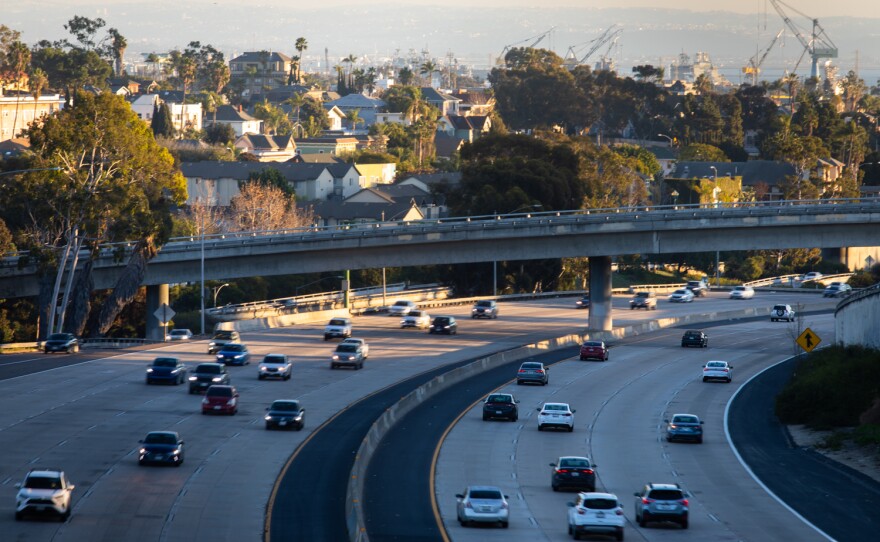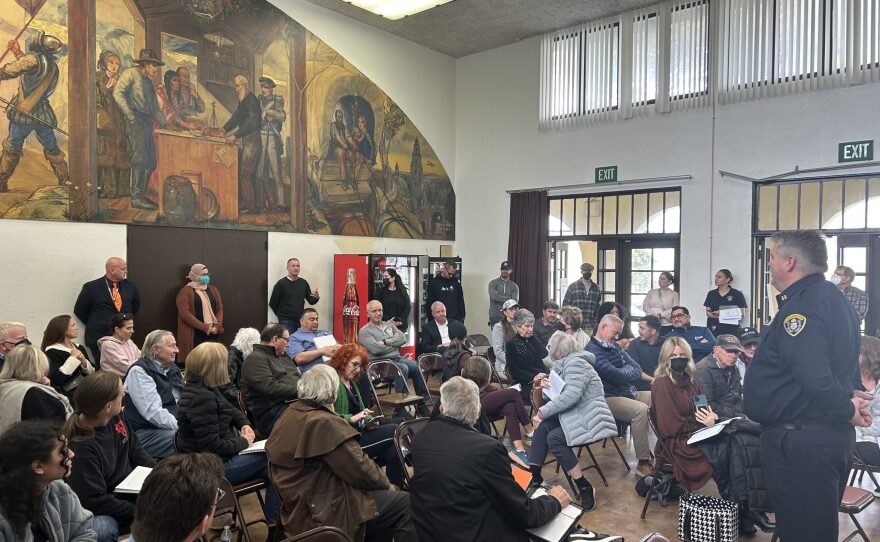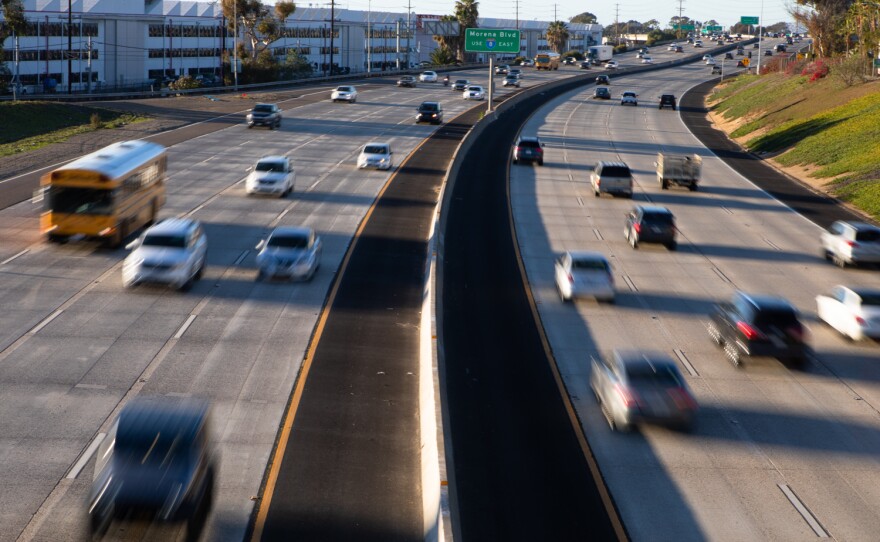Some residents called it mass surveillance technology that erodes personal privacy. Others said it will mark San Diego’s descent into communist China. And still others said it didn’t go far enough.
All last week, San Diego police officials held public meetings in each of the city’s nine council districts to give residents an opportunity to weigh in on proposed surveillance technology.
The police department wants to do two things: return to its controversial “smart streetlight” program, attaching 500 video cameras to light poles throughout the city, as well as add technology to those cameras allowing the agency to collect drivers’ location data.
San Diego police Capt. Jeff Jordon, who led each of the nine public meetings, highlighted horrific anecdotes of murder and kidnapping, and said those crimes and more were solved thanks to smart streetlights and license plate reader technology. But he is sensitive to community concerns, he said, and stressed that the department wants to roll this out responsibly.
“Any technology that you embrace is only as good as the rules you build around it,” Jordon said. “The first one has to be using it in an ethical and legal manner, making sure that we afford protections to people and not use it in an unethical manner.”
Many members of the public who attended the meeting were skeptical, questioning who would have access to the information, under what circumstances and what the police department would do to police itself.
“There are legions of examples of police departments all over the country, including California, violating every single one of those rules,” said Chris McCann, a software architect who has experience with intelligence gathering and surveillance technology. “Why should anyone take at face value any guarantee being made here today?”
If approved, 500 new streetlight cameras would include automated license plate reader technology. They capture any license plate that comes into view and extract the time, date, location and sometimes a partial image of the vehicle. They automatically store the plate number in a searchable database and compare it to a list of vehicles that police are looking for.

State law says the information cannot be shared with any federal or out-of-state law enforcement agencies. Who has access to this information has been a point of contention, especially as state legislatures across the country debate laws that criminalize pregnant people seeking an abortion or parents obtaining gender-affirming care for their children.
An inewsource investigation last year found that most police agencies in San Diego County are spending thousands of dollars every year to collect drivers’ location data using this technology, and revealed that half were sharing that data illegally with out-of-state agencies. All five departments identified in the investigation have since decided to stop sharing the data outside California.
License plate readers are a powerful tool that can assist law enforcement with identifying people who commit crime. And police officials are often quick to highlight all of the times it assisted investigators with heinous crimes.
But the vast majority of information collected most often has nothing to do with solving crime or protecting the public. In Escondido, for example, cameras have scanned more than 8 million license plates, returning 82,000 results — a hit rate of .9%.
And when pieced together, all of the data it collects can offer the government an unrestricted view into the daily routines of drivers in San Diego County — from where they go to who they spend their time with.
Activists say it’s an indiscriminate data collection effort and point to nationwide examples of law-abiding citizens getting victimized thanks to police misconduct or misunderstanding of the technology.
This technology is nothing new to San Diego, however. The police department has already used streetlight cameras and license plate readers — the only difference now is the City Council passed a law last year requiring officials to set clear policy and hold public meetings in each of the city’s nine districts before deploying anything that could be considered surveillance.
And that’s where Jordon came in. His job was to explain the proposal in these public meetings, gather feedback, and present that to the new privacy advisory board and ultimately the City Council to decide if this is right for San Diegans.
inewsource reporters attended two of the nine meetings last week and witnessed overwhelming opposition, with a side of anti-communist rhetoric and a dash of conspiracy theories.
Residents also felt the police department was moving too quickly to roll this out, and criticized officials for holding the meetings in the middle of the day when most people are at work.
Ramla Sahid, an organizer with the Partnership for the Advancement of New Americans, attended a meeting in City Heights. She said it felt like a slap in the face.
“The vast majority of young people who are concerned about this, people of color who are impacted by this, the imams whose mosques you put cameras right in front of, can't access this,” she said, “because who the heck is available at 1 p.m. in the afternoon, except our lovely elders?”

Jordon said the department tried to spread the meetings out to different times and locations to make it easy for people to attend, but it would be impossible to please everyone. Especially with the plan to add surveillance technology.
“I know there’s many of you in this room who will never agree to this proposal,” Jordon said. “You’re fearful of privacy rights and I understand that. I’m not here to convince everybody that this is for them.”
Jordon stressed that access to this information will only be given to officers investigating violent crime. San Diego police will only keep the data for 30 days, he added, and any videos or photos not accessed after 15 days will be overwritten — a policy far more strict than other agencies in the county.
He also maintained that the department does not intend to violate privacy. The equipment includes digital masking, he said, which will block any view where people have a reasonable expectation of privacy, such as schools or homes.
Jordan also assured residents that his department will follow state laws that prohibit sharing this location data with federal and out-of-state agencies.
“Apparently, some law enforcement agencies haven’t read that law either, which is why license plate data from some communities in California ended up in my home state of New Jersey,” Jordon said. “We will not fail at that either.”
And, while trying to assuage fears and rebut the slippery slope concerns expressed by many, Jordon insisted multiple times that any changes to this proposal would trigger the public hearing process all over again. That means even if police wanted to add facial recognition, gunshot detection or other forms of surveillance, the community would know about it ahead of time.
But it didn’t help for some.
Proposed streetlight and automated license plate reader locations.
Click here to view an interactive map.
“One of the concerns is that politics change,” said one man who attended the meeting in La Jolla. “The council people now may be really good people, but ordinances change, even at the U.S. Supreme Court level, things change.”
At least two attendees in La Jolla felt the surveillance wouldn’t go far enough. One asked why so few were dedicated to the mostly white, affluent community.
Jordon said officials looked at where the technology would have the biggest immediate impact, particularly with communities suffering from gun violence.
“There is violence up here, but not the kind of gun violence that we’re seeing in other communities,” Jordon said.
At the end of the day, this comes down to leveraging technology to assist a police department that is facing a shortage of 200 officers and 100 detectives, Jordon said. San Diego is fully funded to fill those positions but they can’t find the applicants.
“Any information that we can (get) to help them investigate and contact persons responsible for crime, at least with a lead on that basic information, for us is very valuable,” he added.








